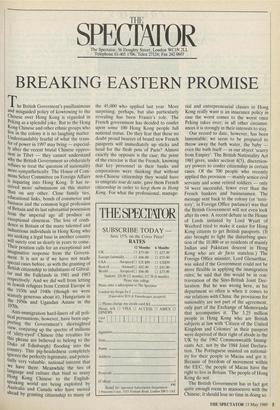SPECTATOR
The Spectator, 56 Doughty Street, London WC1N 2LL Telephone 01-405 1706; Telex 27124; Fax 242 0603
BREAKING EASTERN PROMISE
The British Goverment's pusillanimous and misguided policy of kowtowing to the Chinese over Hong Kong is regarded in Peking as a splendid joke. But to the Hong K. Ong Chinese and other ethnic groups who live in the colony it is no laughing matter. Understandably fearful of what the trans- fer of power in 1997 may bring — especial- ly after the recent brutal Chinese oppres- sion in Tibet — they cannot understand Why the British Government so obdurately refuses to treat the question of nationality more sympathetically. The House of Com- mons Select Committee on Foreign Affairs Is inquiring into Hong Kong. It has re- ceived more submissions on this matter than on any other. Close family ties, educational links, bonds of commerce and business and the common legal profession of Britain and its last substantial possession from the imperial age all produce an exceptional closeness. The loss of confi- dence in Britain of the many talented and industrious individuals in Hong Kong who are seeking a legal base in another country Will surely cost us dearly in years to come. Their position calls for an exceptional and Imaginative response from the Govern- ment. It is not as if we have not made special cases before, as with the granting of British citizenship to inhabitants of Gibral- tar and the Falklands in 1981 and 1983 respectively. And we did well from letting In Jewish refugees from Central Europe in the 1930s and 1940s (though we were scarcely generous about it), Hungarians in the 1950s and Ugandan Asians in the 1970s.
Anti-immigration hard-liners of all poli- tical persuasions, however, have been sup- Porting the Government's shortsighted view, conjuring up the spectre of millions of `slitty-eyed' Chinese (the royalties for this phrase are believed to belong to the Duke of Edinburgh) flooding into the Fnuntry. This pig-headedness completely ignores the perfectly legitimate, and poten- tially very valuable, national interest that we have there. Meanwhile the ties of language and culture that bind so many Hong Kong Chinese to the English- speaking world are being exploited by Australia and Canada who have moved ahead by granting citizenship to many of the 45,000 who applied last year. More surprising, perhaps, but also particularly revealing has been France's role. The French government has decided to confer upon some 100 Hong Kong people full national status. Do they fear that these no doubt proud bearers of brand new French passports will immediately up sticks and head for the flesh pots of Paris? Almost exactly the opposite is the case; the point of the exercise is that the French, knowing that key personnel in their banks and corporations were thinking that without non-Chinese citizenship they would have to emigrate tout de suite, gave them French citizenship in order to keep them in Hong Kong. For what the professional, manage- rial and entrepreneurial classes in Hong Kong really want is an insurance policy in case the worst comes to the worst once Peking takes over; in all other circumst- ances it is strongly in their interests to stay. Our record to date, however, has been lamentable; we seem to be prepared to throw away the bath water, the baby even the bath itself — in our abject 'scurry from Empire'. The British Nationality Act 1981 gives, under section 4(5), discretion- ary powers to confer citizenship in certain cases. Of the 700 people who recently applied this provision — mainly senior civil servants and some retired soldiers — only 54 were successful, fewer ever than the French bankers and businessmen. The message sent back to the colony (or 'terri- tory', in Foreign Office parlance) was that the British Government will not even look after its own. A recent debate in the House of Lords initiated by Lord Wyatt of Weeford tried to make it easier for Hong Kong citizens to get British passports. (It also brought to light the disturbing ques- tion of the 10,000 or so residents of mainly Indian and Pakistani descent in Hong Kong who are de facto stateless.) The Foreign Office minister, Lord Glenarthur, was asked if the Government could not be more flexible in applying the immigration rules; he said that this would be in con- travention of the Sino-British Joint Dec- laration. But he was wrong here, as his department so often is when it comes to our relations with China: the provisions for nationality are not part of the agreement, only part of the Exchange of Memoranda that accompanies it. The 3.25 million people in Hong Kong who are British subjects at law with 'Citizen of the United Kingdom and Colonies' in their passport were deprived of their right of abode in the UK by the 1962 Commonwealth Immig- rants Act, not by the 1984 Joint Declara- tion. The Portuguese insisted on national- ity for their people in Macau and got it. Because of freedom of movement within the EEC, the people of Macau have the right to live in Britain. The people of Hong Kong do not.
The British Government has in fact got quite enough room to manoeuvre with the Chinese; it should lose no time in doing so.


























































 Previous page
Previous page